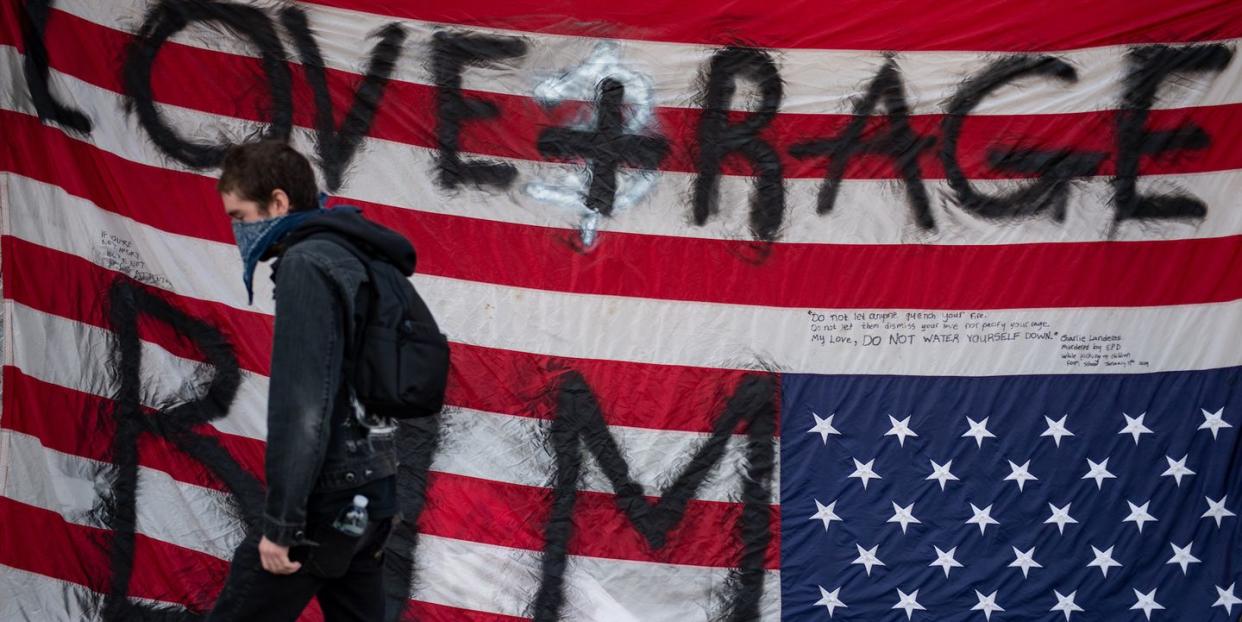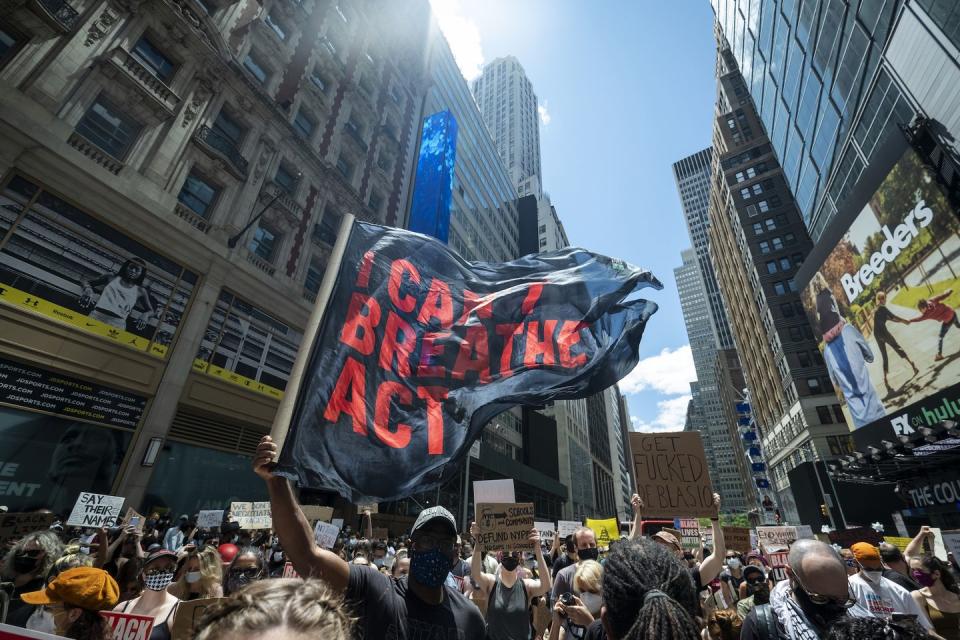American National Pride Is at a 20-Year Low. It Should Be, and It Must Be.

Considering a United States senator has now spent multiple days tweeting at the star of Hellboy II: The Golden Army demanding that he wrestle his friend—who is also a U.S. congressman—maybe it's no surprise that American national pride is at a new low. According to Gallup, while a majority of U.S. adults are still "extremely proud" (42 percent) or "very proud" (21 percent) to be an American, both metrics are at their lowest points in two decades.
This goes far beyond the escapades of Ted Cruz, no matter how pathetic the Texas senator's attempt at macho-by-proxy has become. The Trump Era has merely hastened Cruz's full exposure as a contemptible partisan stuntman, a national career that began in earnest with his various shutdown antics in the Obama years. (Leave Green Eggs and Ham alone, senator.) The current era's namesake, the ringleader of our dangerous national circus, disparaged the appearance of Cruz's wife and suggested his father was involved in the JFK assassination. But Cruz is now one of Trump's more dependable lackeys, a true feat of craven careerism that speaks to the hollowness of our modern politics. Just throw on your team's jersey and start yelling. Cruz won't stand up for his own family, but we're supposed to believe he truly cares about The National Debt?
This change-up in American self-evaluation also surely goes deeper than even the president's daily disgraces, in which he makes a mockery of his office before most citizens wake up in the morning. It goes deeper than his complete mismanagement of the country's pandemic response, a response which has failed to prevent the deaths of 117,000 Americans—27 percent of the world total spread across 4.2 percent of the world population. An exceptional nation, indeed, but this president is merely a symptom of what ails us. He has exposed the emptiness of the United States' commitment to the rule of law, its weak dedication to human rights, the blatant corruption at the highest levels of power, the centrality of white supremacy and the violent imperial impulse in the American experiment. The president's brand of patriotism is the term at its most superficial, a collection of flags and bunting and slogans plastered on a deeply troubled project in order to allow those who benefit from its inequities and its flaws to feel good about the whole thing.
Because that is the re-examination currently under way, thanks to the millions who've taken to the streets in recent weeks, first in response to the police killing of George Floyd in Minneapolis, and now for something more. Black Americans are demanding that the state honor its end of the social contract, and in the process are declaring that it never has. They are insisting on the full rights of citizenship, itself a declaration that the United States has never been a full democracy. Growing numbers of Americans are now demanding that we tear down the false idols of empire that litter our parks and squares, from Confederate traitors to Christopher Columbus. In aggregate, it is a movement that will accept nothing less than an honest accounting of American history. And an honest accounting means diminished American pride, because the truth isn't pretty.

It's hard to say from this Gallup data alone how much of the hit to Americans' self-conception can be tied to the disgraceful political leadership of the moment, and how much is rooted in the honorable task of long overdue truth-telling. (Trump's approval rating came in at 39 percent in the same poll, and national pride among Democrats has collapsed since 2016. Republicans' pride has begun to fall only recently.) Perhaps the two will come to be intertwined. We have learned down the years that elected officials of either party will rarely seek true justice without large-scale pressure from ordinary citizens. (While the modern Republican Party is essentially irredeemable, continually ramping up its attempts to stop citizens from voting, many Democrats have also proven reliable allies to the nation's most powerful interests.) If you want democracy, this moment reminds us, you've got to get out in the street and do it yourself. If you want the truth, you must insist on telling it. And then you pull down the Columbus statue.
This movement, if it succeeds through sheer civic determination, will usher in a moment that will not be fun for many Americans. That particularly goes for those of us who've so benefited from the current order of things. It will involve critically assessing how we got here, and the many horrors perpetrated towards that end. It will involve examining what role each of us personally has played in all this, even if it boils down to silence in the face of atrocity. It does not mean this country has never done anything good, it's that it must do many things better. It will involve abandoning some aspects of our American civic religion, which has long begun with a conclusion—this is the greatest country in the history of the world, the crimes of which are mere accidents of the past—and built up an entire mythology to support it.
That's at the root of why so many got so mad at Colin Kaepernick: he dared suggest that the conclusion was false, and that the stories that many Americans told themselves were, too. This moment will require us to make that claim of American greatness true on the merits, not on the basis of a fairytale. And then, someday, maybe Gallup's poll will be worthy of that buzzy term of the moment: a V-shaped recovery.
You Might Also Like

